
Civilization is a board game designed by Francis Tresham, published in the United Kingdom in 1980 by Hartland Trefoil and in the United States in 1981 by Avalon Hill. The Civilization brand is now owned by Hasbro. It was out of print for many years, before it saw republication in 2018, by Gibsons Games. The game typically takes eight or more hours to play and is for two to seven players.

Origins Game Fair is an annual gaming convention that was first held in 1975. Since 1996, it has been held in Columbus, Ohio at the Greater Columbus Convention Center. Origins is run by the Game Manufacturers Association (GAMA). Origins was chartered to serve gaming in general, including wargaming and miniatures gaming.
World of Darkness is a series of tabletop role-playing games, originally created by Mark Rein-Hagen for White Wolf Publishing. It began as an annual line of five games in 1991–1995, with Vampire: The Masquerade, Werewolf: The Apocalypse, Mage: The Ascension, Wraith: The Oblivion, and Changeling: The Dreaming, along with off-shoots based on these. The series ended in 2004, and the reboot Chronicles of Darkness was launched the same year with a new line of games. In 2011, the original series was brought back, and the two have since been published concurrently.
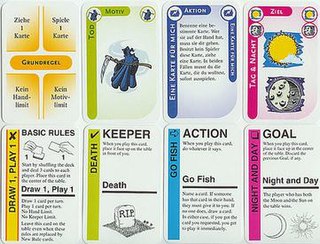
Fluxx is a card game, played with a specially designed deck published by Looney Labs. It is different from most other card games, in that the rules and the conditions for winning are altered throughout the game, via cards played by the players.

Cosmic Encounter is a science fiction–themed strategy board game designed by "Future Pastimes" and originally published by Eon Games in 1977. In it, each player takes the role of a particular alien species, each with a unique power to bend or break one of the rules of the game, trying to establish control over the universe. The game was inducted into the Academy of Adventure Gaming Arts & Design Adventure Gaming Hall of Fame in 1997.

The Longest Day is a board wargame published by Avalon Hill in 1979 that simulates the Allied D-Day invasion of June 1944 and the subsequent Normandy campaign during World War II until August 31st, 1944.
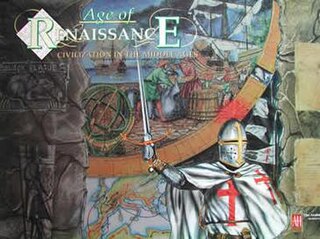
Age of Renaissance is a board game designed by Don Greenwood and Jared Scarborough and published by Avalon Hill in 1996. The game is for 3-6 players and the box claims that the game should take 2–6 hours to play, though as with any serious multiplayer strategy game, this can entirely depend on the players. Age of Renaissance is set in the European Renaissance historical era and is somewhat of a sequel to Civilization. In 1997, Age of Renaissance won the Origins Award for Best Pre-20th Century Board Game of 1996.

Napoleon, subtitled "The Waterloo Campaign, 1815", is a strategic-level block wargame published by Gamma Two Games in 1974 that simulates the Battle of Waterloo. A number of versions of the game have been produced by Avalon Hill and Columbia Games.

Advanced Civilization is an expansion game for the board game Civilization, published in 1991 by Avalon Hill. Ownership of the original game is necessary to play. While Civilization is in print as of November 2019, Advanced Civilization is not, following the dissolution of the original Avalon Hill game company and sale of all rights to titles to Hasbro in 1998.
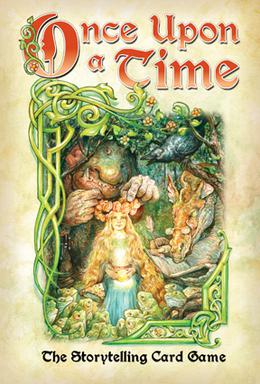
Once Upon a Time is a card game produced by Atlas Games in 1994 in wich the entire group of players collaborate to tell a story, each to use up all of the storytelling cards in their hand first.
Merchant of Venus is a board game, published in 1988 by Avalon Hill, set in an unexplored part of the galaxy during a reawakening of galactic civilization. Players move around the board as traders discovering long forgotten pockets of civilization and buying and selling goods. The game can be played by one to six players. In tournaments it is usually played by four players. The solitaire version, which relies heavily on combat with a militaristic race, has different game mechanics.

1830: The Game of Railroads and Robber Barons is a railroad operations and share trading board game first published by Avalon Hill in 1986 based on an original design by Francis Tresham. The popularity of 1830 spawned an industry creating similar "18XX" games. It was the inspiration for Sid Meier's Railroad Tycoon. 1830 was republished in 2011 through a partnership of Mayfair Games and Lookout Games.

Dune is a strategy board game set in Frank Herbert's Dune universe, published by Avalon Hill in 1979. The game was designed by Bill Eberle, Jack Kittredge and Peter Olotka. After many years out of print, the game was reissued by Gale Force Nine in 2019 in advance of the 2021 Dune film adaptation.
We the People is a board wargame about the American Revolution, published by Avalon Hill in 1993 and designed by Mark Herman. We the People was the first wargame to use cards as the primary way to control the pace and tempo of play, with a strong element of fog of war through the hidden card information. This started a new genre of wargames that have emphasized competitive play and a strong historical narrative.
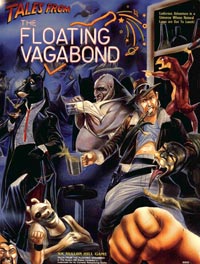
Tales from the Floating Vagabond is a science-fiction role-playing game by Lee Garvin, published by Avalon Hill in 1991. It has the tagline "Ludicrous Adventure in a Universe Whose Natural Laws Are Out To Lunch".
Turning Point: Stalingrad is a board game published in 1989 by Avalon Hill.
Dead of Winter is a semi-cooperative survival strategy board game for two to five players designed by Jonathan Gilmour and Isaac Vega through Plaid Hat Games. The game is set in a post-apocalyptic, zombie-infested colony. Players are faction leaders who must work together to ensure the colony's survival through incoming zombies and lack of supplies. In addition, players have individual, secret win conditions that they must meet to be victorious.

Chicago by Night is a tabletop role-playing game supplement originally released by White Wolf Publishing in 1991 for use with the first edition of their game Vampire: The Masquerade, and released in updated versions for the game's second and fifth editions in 1993 and 2020. As a sandbox-style setting sourcebook for storytellers to use in campaigns, Chicago by Night describes the city of Chicago as it is portrayed within the game's setting, reinterpreted as having a large population of vampires.
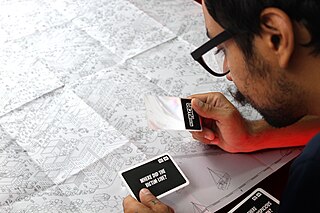
MicroMacro: Crime City is a cooperative tabletop crime-solving hidden object game designed by Johannes Sich and published in 2020 by Edition Spielwiese. The game received positive reviews and won the Spiel des Jahres in 2021. A sequel to the game, MicroMacro: Crime City – Full House was released in August 2021.















